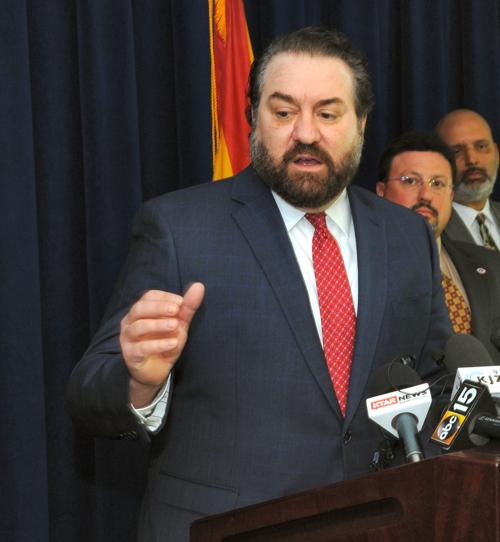PHOENIX — Arizona’s top prosecutor is urging a federal appeals court to allow a Colorado woman and the company she owns to refuse to design a website for a same-sex wedding.
In a new legal brief filed with the 10th Circuit Court of Appeals, Attorney General Mark Brnovich said the rights of Lorie Smith trump a Colorado law that makes it illegal for businesses open to the public to refuse to offer services because of a customer’s sexual orientation. That law also bars companies from posting notices that they won’t serve gays.
A federal judge had sided with the state in the dispute. Now Brnovich, leading a group of 13 other Republican attorneys general, is telling the appellate court they should reverse that ruling.
The filing comes the same week that some Arizona lawmakers are seeking to expand state laws to prohibit discrimination in public accommodations — including businesses like the one run by Smith — based on sexual orientation and gender identification. The bills sponsored by Sen. Kate Brophy McGee, R-Phoenix, and Rep. Daniel Hernandez, D-Tucson, also would effectively nullify last year’s decision of the Arizona Supreme Court allowing a business here to refuse to design wedding invitations for same-sex couples.
Brnovich would not respond to questions about whether he believes existing laws barring discrimination based on age, sex, religion, race and disability should be extended to include sexual orientation and gender identification. It is the Attorney General’s Office that is empowered to enforce such laws.
But with the new filing, Brnovich makes it clear he opposes enacting any laws that would allow the state to force a business to serve all clients, regardless of the owner’s religious beliefs. In fact, Brnovich is using the majority decision in the Arizona ruling favoring the owners of Brush & Nib Studios to convince the federal judges in Colorado to reach the same conclusion in this new case.
In the brief, Brnovich said he and his fellow attorneys general “have compelling interests in protecting their citizens’ freedoms of speech and religion as secured by the United States Constitution.”
“(We) do not, however, have legitimate interests in coercing individuals to use their talents to create government sponsored message or in muzzling individual expression by presuming that the exercise of religion is unlawful,” he wrote. “Such practices, if permitted, are not only constitutionally forbidden, they also would undermine the mutuality of obligation upon which our pluralistic and tolerant society is founded.”
Brnovich’s decision to intervene on behalf of Smith is, in many ways, not a surprise. He also filed legal briefs last year siding with Breanna Koski and Joanna Duka, the owners of Brush & Nib, in their claim to exemption from a Phoenix anti-discrimination ordinance protecting same-sex couples.
There are parallels between the cases.
Smith, like Kosak and Duka, told the federal court in Colorado she is a devout Christian, believes in “biblical marriage” and opposes the extension of marriage rights to same-sex couples.
She asked the judge there to issue a ruling declaring she was not bound by the Colorado law, which prohibits discrimination in providing goods and services on various grounds, including sexual orientation. Smith also wanted the court to say that she is free to publicize that she won’t accept such business.
Judge Marcia Krieger ruled that Smith had no legal standing to challenge the anti-discrimination law. She also rejected any claim Smith has a First Amendment right to advertise that she wouldn’t serve gays.





